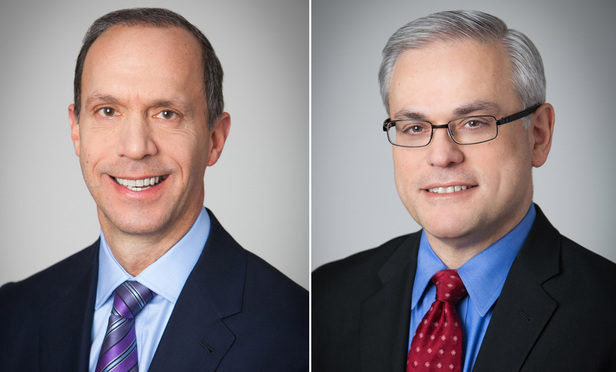Nicholas J. Pappas

February 06, 2018 | New York Law Journal
Access vs. Use: The CFAA in the Age of the DTSAEmployment Law columnists Jeffrey S. Klein and Nicholas J. Pappas write: Once the only reliable statutory argument for federal-question jurisdiction in a trade secret dispute, the CFAA now acts as a complement to the DTSA by protecting sensitive information from a different perspective. This being said, several circuits are split on the scope of the protections afforded to employers under the CFAA, limiting the statute's effectiveness in certain jurisdictions.
By Jeffrey S. Klein and Nicholas J. Pappas
10 minute read

December 05, 2017 | New York Law Journal
Complying With Immigration Law Following the DACA RollbackEmployment Law columnists Jeffrey S. Klein and Nicholas J. Pappas write: As employees' work authorizations begin to expire, employers would be well served by confirming that their policies are in full compliance in regard to verification of their employees' work authorizations.
By Jeffrey S. Klein and Nicholas J. Pappas
10 minute read

October 03, 2017 | New York Law Journal
The Challenges of Regulating Employee SpeechIn their Employment Law column, Jeffrey S. Klein and Nicholas J. Pappas discuss some recent controversies involving employee speech and the laws governing employers' ability to regulate and respond to disruptive speech in the workplace.
By Jeffrey S. Klein and Nicholas J. Pappas
10 minute read

August 01, 2017 | New York Law Journal
U.S. Supreme Court Clarifies ERISA's 'Church Plan' ExemptionIn their Employment Law column, Jeffrey S. Klein and Nicholas J. Pappas review the debate in lower courts regarding the scope of the "church plan" exemption from ERISA and whether it applies to plans established by church-affiliated entities, such as hospitals and schools; explain the Supreme Court's holding in 'Advocate Health'; and offer some suggestions for church-affiliated employers to navigate the legal terrain of the "church plan" exemption.
By Jeffrey S. Klein and Nicholas J. Pappas
10 minute read

June 06, 2017 | New York Law Journal
New York City Bans Employers' Inquiries Into and Use of Salary HistoryEmployment Law columnists Jeffrey S. Klein and Nicholas J. Pappas write: Halloween could become a very scary day for New York City employers, when the city ordinance restricting an employer from inquiring into an employee's salary history becomes effective.
By Jeffrey S. Klein and Nicholas J. Pappas
9 minute read

April 04, 2017 | New York Law Journal
New Restrictions on Using Earnings History to Set CompensationEmployment Law columnists Jeffrey S. Klein and Nicholas J. Pappas discuss the circuit split on whether the Equal Pay Act prohibits sole reliance on prior earnings to explain a wage differential challenged under the Act, summarize recent measures in California, Massachusetts, and Philadelphia restricting the use of prior earnings, and provide guidance for employers seeking to maintain compliant hiring and pay practices.
By Jeffrey S. Klein and Nicholas J. Pappas
20 minute read

January 30, 2017 | New York Law Journal
Recent Developments in Non-Compete LawIn their Employment Law column, Jeffrey S. Klein and Nicholas J. Pappas survey recent legislation aimed at narrowing the scope of interests that will legally support judicial enforcement of restrictive covenants and/or limiting the enforceability of non-compete agreements, examine several specific government investigations into non-compete practices, and outline suggestions for employers to consider when reviewing their use of non-compete agreements.
By Jeffrey S. Klein and Nicholas J. Pappas
19 minute read

December 02, 2016 | New York Law Journal
ERISA Liability From 401(k) Plan Revenue SharingIn their Employment Law column, Jeffrey S. Klein and Nicholas J. Pappas analyze two cases where plaintiffs challenged revenue-sharing arrangements under the Employee Retirement Income Security Act. "Revenue sharing" refers to an arrangement where a mutual fund, offered as an investment option in a 401(k) plan, pays either the plan's sponsor (usually the employer) or a plan service provider (a third-party vendor) a fee for performing administrative or record-keeping services for the plan. This concerns plan participants because mutual funds typically pay such revenue-sharing fees to the employer or service provider by periodically deducting the fees from the retirement plan's invested assets.
By Jeffrey S. Klein and Nicholas J. Pappas
18 minute read

September 30, 2016 | New York Law Journal
Class Action Waivers in Arbitration AgreementsEmployment Law columnists Jeffrey S. Klein and Nicholas J. Pappas address the question of whether class-action and collective-action waivers in employment arbitration agreements violate the National Labor Relations Act or are enforceable under the Federal Arbitration Act and how that question has split the federal circuits.
By Jeffrey S. Klein and Nicholas J. Pappas
20 minute read

July 29, 2016 | New York Law Journal
Confidentiality Provisions Under Heightened ScrutinyIn their Employment Law column, Jeffrey S. Klein and Nicholas J. Pappas examine key developments impacting confidentiality provisions in workplace agreements and policies, and provide recommendations for employers in drafting such provisions in order to reduce the risk of challenges to their enforceability.
By Jeffrey S. Klein and Nicholas J. Pappas
22 minute read
Trending Stories
- 1TikTok Law and TikTok Politics
- 2California Supreme Court Vacates Murder Conviction in Infant Abuse Case
- 3New York’s Proposed Legislation Restraining Transfer of Real Property
- 4Withers Hires Lawyers, Staff From LA Trusts and Estates Boutique
- 5To Speed Criminal Discovery, NY Bill Proposes Police-to-Prosecutor Pipeline For Records
More from ALM
- Scan In Progress: Litigators Leverage AI to Screen Prospective Jurors 1 minute read
- Legal Speak at General Counsel Conference East 2024: Match Group's Katie Dugan & Herrick's Carol Goodman 1 minute read
- Legal Speak at General Counsel Conference East 2024: Eric Wall, Executive VP, Syllo 1 minute read



